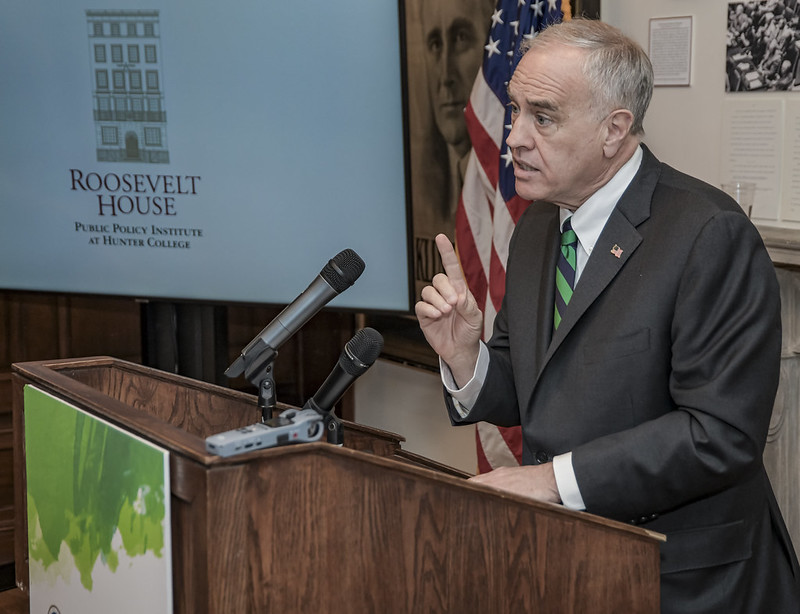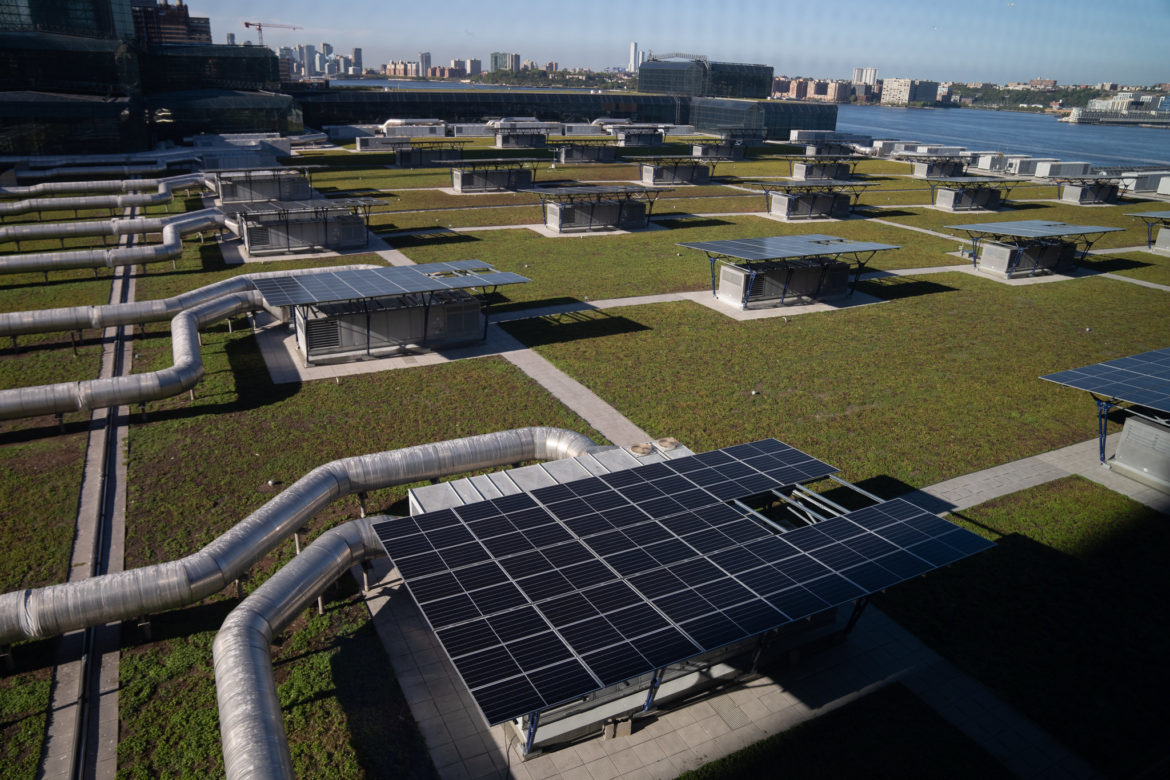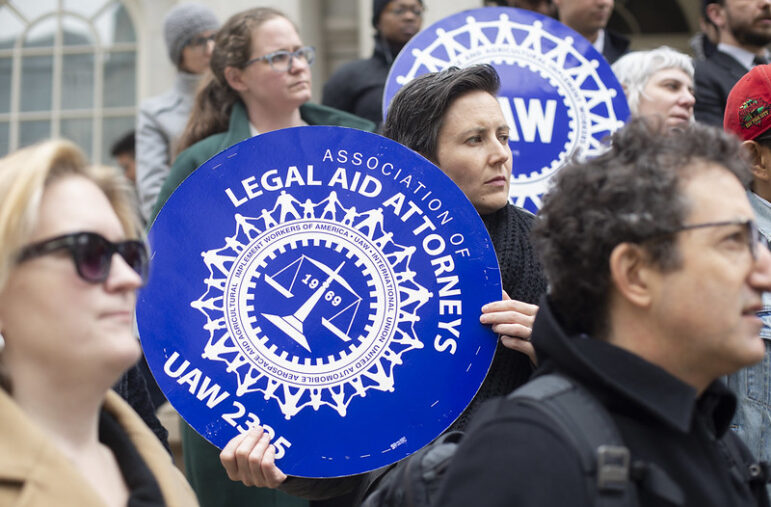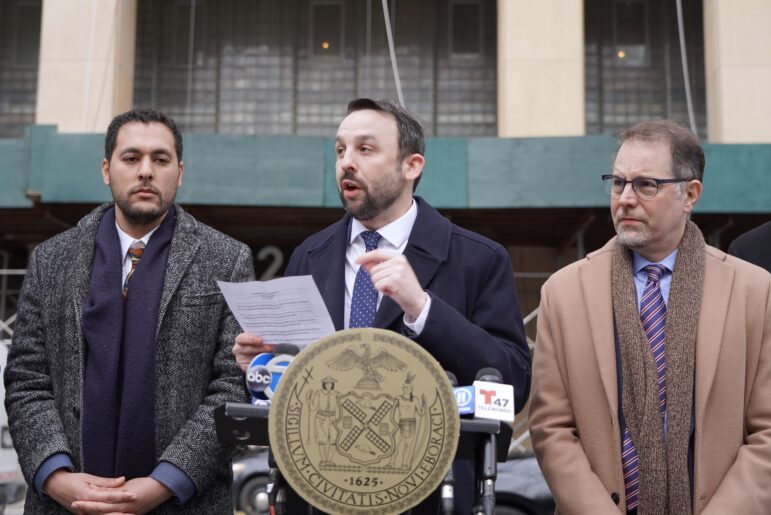An audit carried out by the State Comptroller’s Office says the Public Service Commission isn’t taking enough action to help the state reach its clean energy goals, and doesn’t have a backup plan if New York fails to achieve them.

NYS Comptroller’s Office
Thomas DiNapoli at a press conference in April.The Public Service Commission (PSC), the state agency that keeps utility companies in check, isn’t taking enough action to help New York meet its clean energy goals, a new audit carried out by the State Comptroller’s office found.
The audit examined documents that the PSC kept between 2016 and 2023 to track the state’s progress towards meeting the ambitious targets laid out by New York’s landmark climate law, the Climate Leadership and Community Protection Act (CLCPA).
The law, which went into effect five years ago Thursday, requires the state to phase out the use of climate change-inducing fossil fuels like oil and gas and have 70 percent of its power come from renewable energy by 2030.
But a recent state report found that New York is only likely to hit that goal in 2033. So far, only 28 percent of New York’s electricity is generated by renewables, according to an entity that oversees the state’s electricity grid, the New York Independent System Operator.
As the state lags in these efforts, the audit claims that the PSC has taken “inadequate” steps in planning, monitoring and assessing potential obstacles. Perhaps even more alarming, the PSC has failed to come up with a “backup plan” if the state fails to hit these targets, relying instead “on the continued use of fossil fuels to generate electricity,” the audit from State Comptroller Thomas DiNapoli finds.
The PSC disagrees with these claims. Spokesperson James Denn told City Limits in an email that the agency is “disappointed” that the Comptroller’s office “overlooks several significant steps taken and factors that have impacted progress to date.”
The agency cited accomplishments achieved over the last five years, like directing the New York State Energy Research and Development Authority (NYSERDA) to undertake new renewable energy projects despite “unprecedented and evolving market conditions outside of New York’s control.”
The PSC has also “approved $5 billion in transmission investments to support renewable projects,” and worked with government authorities on renewable energy initiatives that have helped to lower the cost to consumers.
“Much of this work appears to have been discounted in the [Comprotroller’s] report, and the Department’s response highlights several instances where it disagrees with [the] findings,” Denn from the PSC said in an emailed statement.
But when it comes to its planning process, the audit claims the PSC “is using outdated data, and, at times, incorrect calculations.”
For instance, when calculating the state’s ability to meet renewable energy targets, the audit claims the agency failed to take into account the clean energy projects have been scrapped or delayed. Between 2005 and 2023, 12 percent of contracted large-scale renewable projects were canceled.
Also, a master spreadsheet the PSC uses to track the state’s clean energy progress, reviewed by the Comptroller’s office, didn’t include updated information on how much “load” or electricity will be in demand as New York shifts off fossil fuels.

Gov. Hochul’s Office
Solar panels on the roof of the Javits Center in Manhattan. New York State is required to to phase out the use of climate change-inducing fossil fuels like oil and gas and have 70 percent of its power come from renewable energy by 2030.“As time went on, they didn’t update some of that necessary information which is essential to identifying how close they are to meeting [the state’s climate] goals,” said Brandon Ogden, audit manager at the State Comptroller’s Office, who had access to the spreadsheet and worked on the audit.
New mandates, like the one put forth by Gov. Kathy Hochul in 2021 requiring that all new vehicles purchased in New York be zero-emission models beginning in 2035, will amp up demand for more electricity. The state needs to know what that demand will look like, the audit argues, to plan for more renewables to meet the CLCPA’s 70 percent clean energy target.
The audit goes on to point out that the PSC has not “reasonably estimated” the cost of transitioning to renewable energy and adds that sources of funding “to cover those costs have not been identified.” As a result, an unfair burden is placed on consumers or ratepayers, who end up becoming “the primary source of funding.”
“The lack of alternative funding sources adds additional risk to whether the State can meet its goals timely,” the audit notes.
In response to this, the PSC told the Comptroller’s office that it has “continuously updated” these cost estimates “based on best available data.” But a series of unpredictable events like COVID-19, inflation, and supply chain challenges “have led to major revisions in the costs of clean energy deployment,” the agency added.
While unprecedented circumstances might make reaching the state’s climate goals difficult, the audit also claims that the PSC has not come up with “a formal backup” if New York’s goals prove to be “unachievable.” The PSC’s only strategy, the audit says, is to suspend or modify the obligations outlined in the Climate Act and resort “to the use of fossil fuels.”
But this is a dangerous move, environmentalists warn.
“Their backup plan is to keep the status quo and that’s unacceptable,” said Raya Salter, energy attorney and a member of the council that built New York’s road map for achieving the mandates laid out in the Climate Act.
“The status quo isn’t working for anyone except the fossil fuel industry. Our rates are sky high and going up every year. Plus, the dirty fuels are causing the climate crisis. So the status quo is not okay. We’re supposed to be moving to alternatives,” she added.
To reach the reporter behind this story, contact Mariana@citylimits.org. To reach the editor, contact Jeanmarie@citylimits.org
Want to republish this story? Find City Limits’ reprint policy here.








